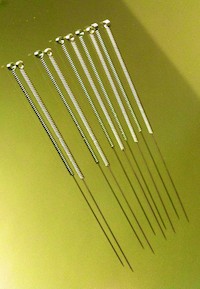New research demonstrates that acupuncture prevents fatigue and enhances athletic endurance.  Scientists measured the effects of three acupuncture points on the swimming task ability and liver mitochondrial function of laboratory rats in a highly controlled investigation. The results revealed that the normal control group and model group had significantly shorter swimming exhaustion times than the acupuncture group, which demonstrated objective improvements in athletic endurance. The acupuncture group also demonstrated improvements in liver mitochondrial-respiratory function with a significantly lower oxygen consumption rate than the normal control and model groups. The acupuncture group also demonstrated significant improvements in the liver mitochondrial respiratory control rate (RCR) and the ratio of phosphorus to oxygen (P/O).
Scientists measured the effects of three acupuncture points on the swimming task ability and liver mitochondrial function of laboratory rats in a highly controlled investigation. The results revealed that the normal control group and model group had significantly shorter swimming exhaustion times than the acupuncture group, which demonstrated objective improvements in athletic endurance. The acupuncture group also demonstrated improvements in liver mitochondrial-respiratory function with a significantly lower oxygen consumption rate than the normal control and model groups. The acupuncture group also demonstrated significant improvements in the liver mitochondrial respiratory control rate (RCR) and the ratio of phosphorus to oxygen (P/O).
The researchers measured additional interesting findings. They compared acupuncture point prescriptions. Group 1 received electroacupuncture at CV4 (Guanyuan) and ST36 (Zusanli) plus manual acupuncture stimulation at GV20 (Baihui). Group 2 received electroacupuncture at CV3 (Zhongji) and SP9 (Yinlinquan) and manual acupuncture stimulation at Yintang (EX-HN3). Group 1 demonstrated significantly better scores than group 2 thereby demonstrating that the CV4, ST36, GV20 acupuncture point prescription has markedly greater anti-fatigue effects.
The investigators note that the treatment principle for the CV4, ST36, GV20 acupuncture point prescription is Shuanggu Yitong, “strengthening both the congenital foundation and the acquired constitution and regulating the yang-qi of the body.” The measurements were geared to quantify the anti-fatigue effects of the point prescription by measuring physical activity capabilities and liver functions in laboratory rats. The researchers concluded that, “Electroacupuncture of CV4 and ST36 plus manual acupuncture stimulation of GV20 can improve the anti-fatigue capability in aging rats with yang-deficiency, which may be related to its effects in reducing liver mitochondrial oxygen consumption and increasing liver mitochondrial RCR and ratio of P/O.”
Another study took a different tack to determine if acupuncture has beneficial effects on bodily strength and endurance. Researchers from the International Society for Autonomic Neuroscience discovered that acupuncture controls the heart rate and increases the strength of cardiac autonomic function. The research indicates that specific acupuncture points may help to prevent heart attacks (myocardial infarctions) and arrhythmias.
Researchers conducted a study of acupuncture points CV17 (Shanzhong) and CV16 (Zhongting). Needling acupoint CV17 decreased the heart rate and increased the power of the high-frequency component of the HRV (heart rate variability), an index of the body’s ability to maintain control of the heart beat rate and rhythm through vagus nerve activity. The researchers conclude that CV17 “causes the modulation of cardiac autonomic function.” CV16 did not change the HRV or demonstrate the same level of beneficial effects on the heart rate as CV17. CV17 is able to activate the autonomic nervous system to control the heart rate by increasing vagal activity. Depressed HRV after MI, a heart attack, reflects a decrease in vagal activity and leads to cardiac electrical instability. Since acupuncture at CV17 increases the cardiac vagal component of HRV, it is an important acupuncture point for patients recovering from MI.
References:
Wang, H., J. Liu, J. M. Liu, J. F. Lü, M. Y. Chen, and J. Z. Wang. "Effect of electroacupuncture stimulation of" Guanyuan"(CV 4), bilateral" Housanli"(ST 36), etc. on anti-fatigue ability and liver mitochondrial respiratory function in ageing rats with Yang-deficiency." Zhen ci yan jiu= Acupuncture research/[Zhongguo yi xue ke xue yuan Yi xue qing bao yan jiu suo bian ji] 38, no. 4 (2013): 259.
Kurono Y, Minagawa M, Ishigami T, Yamada A, Kakamu T, Hayano J. Auton Neurosci. Acupuncture to Danzhong but not to Zhongting increases the cardiac vagal component of heart rate variability. 2011 Apr 26;161(1-2):116-20. Epub 2011 Jan 7.


